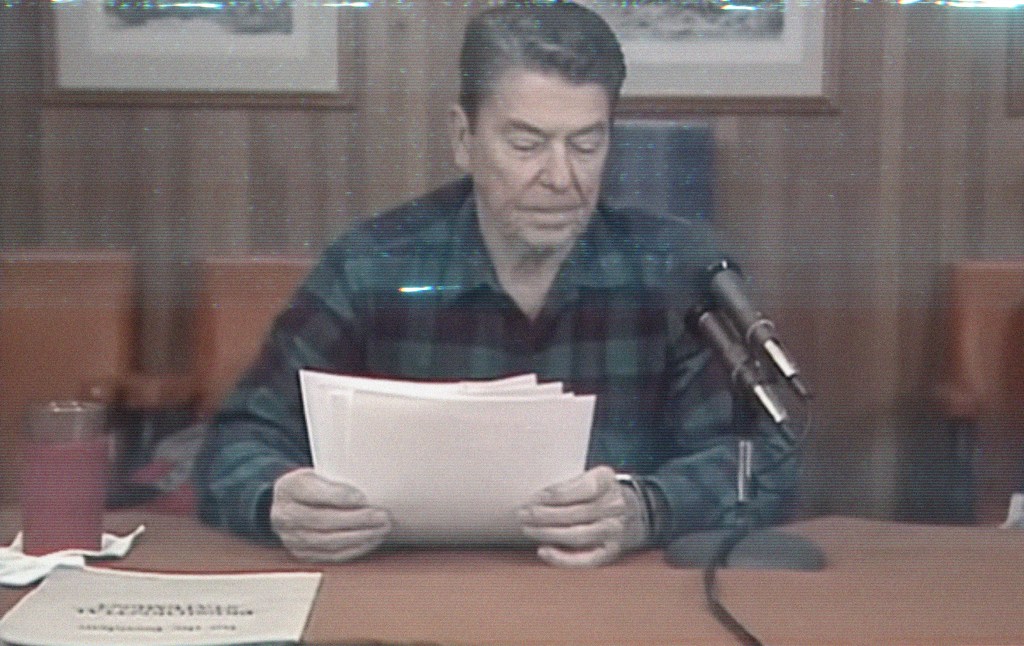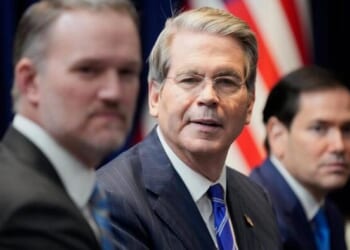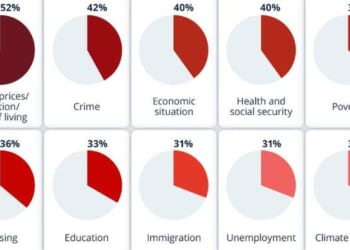
The cherry on top came when Maloy’s spokesman nervously assured the Journal that the congresswoman had prayed for the president’s trade war to succeed, not for it to end. As in Russia, even private criticism of the czar is risky for a member of the Duma if it gets back to the Kremlin.
No elected Republican will stop Trump’s glorious march toward mercantilism. Or, rather, no living elected Republican will.
But what about a dead one?
Ronald Reagan is the unlikely flashpoint in the latest skirmish between the White House and Canada. Last week, Ontario Premier Doug Ford launched a $75 million ad campaign in the United States that featured audio of the Gipper criticizing protectionism during a short address from April 1987. You should watch it, and not just because it’s necessary context for what follows. There are less edifying ways to spend five minutes.
The president and Canadian Prime Minister Mark Carney met earlier this month in Washington to talk trade and appeared on track for a deal. No more: In a post on Truth Social yesterday, Trump pitched a fit over Ford’s supposedly “FAKE” ad and declared that negotiations with Canada were over. To support his claim, he flagged a statement from the Ronald Reagan Presidential Foundation that accused Ford of “misrepresenting” Reagan’s address by quoting only “selective” parts of it.
Then he went on a manic, all-caps, late-night posting tear about it, attributing the stock market’s climb and pretty much every other aspect of American power to his trade policy. Reagan “LOVED TARIFFS FOR OUR COUNTRY, AND ITS NATIONAL SECURITY,” Trump insisted, not at all insecurely.
Why is he so spun up about this? What is he worried about?
He just likes tariffs.
Do I really need to explain to an audience of Dispatch subscribers that Ronald Reagan didn’t “love tariffs”?
For starters, he certainly didn’t view them as a cudgel presidents should wield to satisfy grudges. Trump has done that repeatedly with his trade policy—and not just with respect to tiny, economically insignificant countries either. He levied Brazil when the government there refused to drop criminal charges against his caudillo buddy, Jair Bolsonaro. Then he levied India after the prime minister rebuked him for claiming to have settled India’s latest conflagration with Pakistan.
Now, Trump is canceling negotiations with America’s second-largest trade partner because his ass is chapped over an ad funded by a provincial Canadian politician who isn’t even a member of Carney’s ruling party.
Reagan was an ideologue, not a monarchist. He would have been mortified, I’m sure, by a president exploiting an economy on which millions of American families depend as leverage for personal score-settling. But he also would have been mortified by a president being stupid enough to believe that trade barriers encourage, rather than retard, economic growth.
Reagan did impose tariffs occasionally in office. That was the subject of his April 1987 address, in fact, and presumably why the Reagan Foundation felt justified in claiming that Ford’s ad “misrepresented” the former president’s remarks. Watch the clip and you’ll see that it begins with Reagan announcing new duties on Japanese goods to retaliate for violations of a trade agreement with respect to semiconductors.
But his tone is downright apologetic. He says he intends to meet with the Japanese prime minister as soon as possible to resolve the impasse and ultimately cancel the tariffs. Then he launches into a two-minute stemwinder on how protectionism ruins economies, key parts of which ended up in Ford’s ad. You don’t often see presidents introduce a new policy by making the ideological case against it, but Reagan plainly was keen for Americans not to get comfortable with tariffs. In narrow circumstances, he explained, they’re useful as temporary leverage to restore the free-trade status quo.
That’s not how Trump views tariffs, as even the White House occasionally acknowledges. He treats trade deficits as per se unfair practices that justify retaliation in the form of import duties. (That was the logic of the “national emergency” that supposedly justified the Liberation Day tariffs, anyway.) But he goes further: The fact that the U.S. runs trade surpluses with some nations, like Brazil, hasn’t stopped him from levying them too. When members of Trump’s Cabinet have been asked whether, a la Reagan and Japan, his tariffs are designed to cow other nations into simply liberalizing their own trade policies, they’ve said no.
This trade war isn’t retaliatory. It isn’t being waged to ensure “reciprocity.” The president is a mercantilist, enough so that his so-called “national emergency” duties now target things like bathroom vanities. Dispatch contributor Scott Lincicome said all there is to say: He just likes tariffs.
Rolling over.
And the Reagan Foundation surely understands that. So why did they go to bat for Trump by insisting, falsely, that Doug Ford’s ad misrepresented Reagan’s words?
We can only wonder. If we want to be charitable, we might note that the ad rearranged some of the sentences in Reagan’s monologue without distorting his argument—which, if you squint hard, vaguely resembles “misrepresenting” him, I guess? Or we might reason that the guardians of the Gipper’s legacy understandably don’t want him thrust into a battle with Trump for the souls of modern Republicans, as their side would be destined to take heavy casualties. Somewhat absurdly given the classical liberalism he stood for, Reagan remains a respected figure in the modern GOP. Turning him into a scourge of Trumpism from the grave would change that.
But if we’re not feeling so charitable, we might speculate that they rolled over for the president for the same reason Celeste Maloy and many others have. Maybe they got a call from the White House letting them know that it would be “appreciated” if they denounced Doug Ford’s ad. And maybe that call came with a reminder that nonprofits that have made an enemy of Trump are, or soon will be, facing trouble legally and financially. Frankly, that sort of warning might be unnecessary at this point: Protection rackets don’t require overt threats to work once a few business owners get roughed up and word gets around the neighborhood.
The brain trust at the Reagan Foundation could have issued something short and sweet about not enlisting the former president in political disputes when he’s not here to defend himself. Instead they lied on Trump’s behalf by pretending that Ford’s ad distorted Reagan’s position on trade when it didn’t, the latest case of a conservative institution embarrassing itself in service of a fascist kakistocracy. Perhaps if the foundation’s board members pray very hard, like Rep. Maloy, things in America will magically be set right.
No wonder so many old-school Republicans have converted to postliberalism. If the keepers of the Reagan Revolution’s flame can’t be bothered to actually keep it, why should anyone else?
Rival authorities.
We still haven’t answered the question, though. Why is Trump so ticked off about Ford’s ad?
It’s not like there’s a huge constituency for it here in the United States. Trump-hating liberals have no use for Reaganism and Trump-hating conservatives, er, basically don’t exist. As one Dispatch colleague put it to me this morning, “If Ford’s audience was normie Republicans, someone should have told him there’s like a dozen of us left.”
Ford’s ad is a clarion call to the American right to return to first principles, you might say to that. To which I would reply: My dude, the party of the right is doing actual socialism now. Trump isn’t even pretending otherwise, yet he still enjoys Heaven’s Gate-level devotion within the GOP. We’re so far away from first principles that we couldn’t spot them with the Hubble telescope. Republicans won’t awaken from the ideological coma they’ve entered during my lifetime, and if I’m wrong about that, it won’t be an ad from an obscure Canadian politician that rouses them.
So, no, I don’t think the president’s anxiety is chiefly about Reagan. Although it’s partly about Reagan.
Ronald Reagan is the only politician of the past 50 (or 250?) years whose stature rivals Trump’s among Republicans. He became an avatar of victory by leading a right-wing political revival that produced three straight presidential terms for the GOP, a feat neither party had managed since the era of Franklin Roosevelt. And he became an avatar of strength when his hawkish resolve toward defeating communism led to a Soviet capitulation shortly after he left office.
The GOP’s nostalgic fantasy about making America great again can be slippery about identifying when, precisely, America was great, but the Reagan era is an obvious candidate—pre-NAFTA, post-Vietnam, the right in ascendance, and the economy booming. It’s a potent symbol of American glory in the right’s collective imagination and the president understands how powerful right-wing imaginations can be. Trump himself is famously a creature of the 1980s, having cemented his national celebrity during that decade. It’s not surprising that he’d be sensitive about claims that he’s betrayed the ethos of that age.
Ronald Reagan is also, well, dead, which means he can’t be bullied or threatened or primaried to make him fall in line behind protectionism. (Although the Reagan Foundation sure can.) His opinion on tariffs is clear and preserved in amber for eternity in Doug Ford’s ad. It will not change to suit Donald Trump’s political needs, which is why the president is reduced to sputtering without explanation that the ad is “FAKE.”
And of course, that opinion can’t be dismissed by the right as left-wing hooey the way Democratic critiques of Trump’s economic policies routinely are.
The ghost of Reagan could even end up haunting the GOP next fall as tariffs drive prices even higher and Republicans’ polling on the economy falls. There’s no precedent in the Trump era for a right-winger whose authority rivals the president’s own persuasively (or even unpersuasively) blaming him for some consequential failure of policy. Zombie Reagan’s prescient case against tariffs is as close as we’ve come and as close as we’ll ever come. And in a party whose members seem completely unmoored from ideology and slavishly obedient to authority, maybe that’s worth something.
But as I say, it’s not Reagan whom Trump is mainly worried about here. It’s another rival authority: the Supreme Court.
Meltdown.
Trump was candid about that in last night’s manic Truth Social spree. “Canada is trying to illegally influence the United States Supreme Court in one of the most important rulings in the history of our Country,” he said in one post about Ford’s ad. “THE MOST IMPORTANT CASE EVER IS IN THE UNITED STATES SUPREME COURT,” he repeated for emphasis in another.
I like the idea of Amy Coney Barrett channel-surfing after work, unsure of where she stands on tariff authority, only to have the intellectual clouds part when she stumbles on a Canadian PSA reminding her that the most celebrated small-government ideologue in the last century of American politics favored free trade.
In fairness, Trump (probably) doesn’t sincerely believe the court will be influenced by Ford’s ad. He’s just trying to mau-mau the justices in advance of their decision on his tariff authority by implying that it would be un-American, literally, to rule against him. He’s been mau-mauing them for months, insisting at various times that an adverse judgment would cause another Great Depression and “literally destroy the United States of America.” He’s even said that he plans to attend oral arguments on November 5.
That’s not because he’s intellectually curious about the legal niceties surrounding executive tariff powers, needless to say. It’s because he wants to stare the justices down and signal with his presence that he’s very, very invested in this case and his reaction will be very, very bad if it doesn’t go his way. The three members whom he put on the court in his first term will decide whether he wins; no doubt he means to communicate to them by showing up that they “owe” him, or so he believes.
Intimidation is the One Neat Trick of postliberalism, so naturally that’s what he’s resorted to here.
The point is that his anxiety about losing his tariff powers is peaking as November 5 approaches, and Ford’s ad may have reminded him inadvertently that “his” justices on the court are Reagan Republicans more than they are Trump Republicans. That’s been a sore point for him since January 20, enough so that he attacked the Federalist Society for recommending judges in his first term who are more loyal to the Constitution than they are to him. Now his most prized autocratic possession, his authority to create financial leverage for himself over any industry he likes in any country he likes for any reason he likes, is in the hands of those Reaganites. And he’s not feeling good about it.
If they rule against him, he’s going to lose what’s left of his flipping mind.
I mean it. As dystopian as the Trump presidency has been already, the court snatching away baby’s tariff bottle will open a darker phase. It will start with pressure on congressional Republicans to nuke the filibuster and pass a statute reinstating Trump’s imperial power over trade, or even pack the court with more compliant chuds. (“Justice Ingrassia” has a ring to it.) All of which would be bad—but legal.
We’re unlikely to get away that easily, though. The president’s base will screech that the hour has come to start ignoring court rulings forthrightly and usher in a proper dictatorship. The groundwork for defying the judiciary has already been laid inside and outside of courtrooms; Trump is simply waiting for an adverse ruling of great enough import to his fascist fans to grant him the political capital needed to make a move so drastic and irreversible.
Although what he’s really hoping, of course, is that it won’t come to that. His intimidation campaign against the court will work, he expects, and lead them to bless his tariff authority reluctantly if only for the sake of avoiding a momentous, destabilizing constitutional crisis. Doug Ford’s ad confounded that plan, at least temporarily: By reminding America that Ronald Reagan thought tariffs were garbage policy, it potentially steeled the spines of conservatives who might soon be forced to decide whether to side with SCOTUS against the president if the justices have the nerve to rule against him.
There’s no room for rival authorities in postliberal America. Not even dead ones.
















